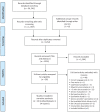Systematic Review: Effectiveness of psychosocial interventions on wellbeing outcomes for adolescent or adult victim/survivors of recent rape or sexual assault
- PMID: 32838568
- PMCID: PMC8777327
- DOI: 10.1177/1359105320950799
Systematic Review: Effectiveness of psychosocial interventions on wellbeing outcomes for adolescent or adult victim/survivors of recent rape or sexual assault
Abstract
Sexual assault and rape are common forms of sexual violence/abuse. The psychological/health consequences represent significant and ongoing harm. It seems imperative that victim/survivors receive evidence-based support within first response settings. To assess what psychosocial interventions work for victim/survivors of a recent sexual assault. Twenty-seven electronic databases were systematically searched. Narrative data synthesis was used to read across studies. Reporting format follows PRISMA checklist. Ten studies were identifed including range of interventions. The evidence is sparse and scientifically weak, common flaws are reviewed. There is some weak evidence for the impact of video and cognitive behavioural therapy (CBT) based interventions, especially trauma processing. There is a gap in the evidence base on psychosocial interventions for victim/survivors of sexual assault and higher quality research is required.
Keywords: intervention; sexual health; sexual violence; systematic review; trauma.
Conflict of interest statement
References
-
- Acierno R, Resnick HS, Flood A, et al. (2003) An acute post-rape intervention to prevent substance use and abuse. Addictive Behaviors 28 (9): 1701–1715. - PubMed
-
- Anderson B, Frank E. (1991) Efficacy of psychological interventions with recent rape victims. In: Wolbert Burgess A. (ed.) Rape and Sexual Assault III: A Research Handbook. New York: Garland, pp.75–103.
-
- Bisson J, Andrew M. (2007) Psychological treatment of post-traumatic stress disorder (PTSD). The Cochrane Database of Systematic Reviews. (3). - PubMed
-
- Bisson JI, Jenkins PL, Alexander J, et al. (1997) Randomised controlled trial of psychological debriefing for victims of acute burn trauma. The British Journal of Psychiatry 171(1): 78–81. - PubMed
Publication types
MeSH terms
LinkOut - more resources
Full Text Sources
Medical
Miscellaneous


